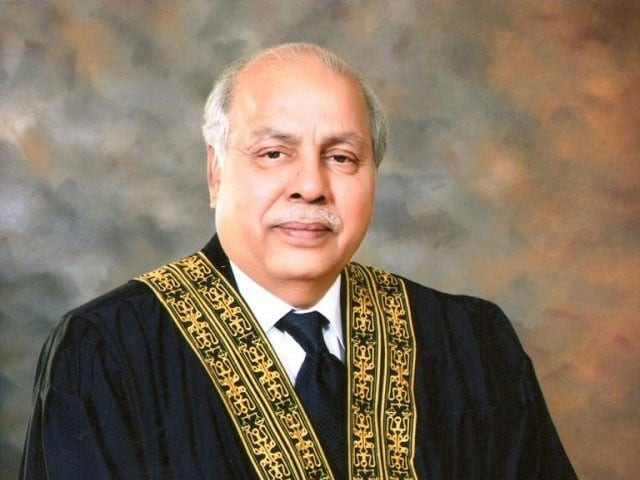CJ tells Islamabad, Sindh police to pick up the pace
Justice Gulzar appreciates three provinces, AJK, G-B police for their performance

Chief Justice Gulzar Ahmed has expressed concerns over the performance of the police forces of Islamabad and the Sindh province due to “low conviction rates” in the said areas, saying that “it is one of the major causes of increasing crime rate”.
“[The] Sindh police should itself proactively improve its performance rather to have expectations from other departments,” CJ Gulzar said while chairing a meeting of the Police Reforms Committee (PRC) to review the implementation status of its report and its overall impact on policing across the country on Thursday.
Senior Puisne Judge Supreme Court Justice Umar Ata Bandial, serving IGPs from all four provinces, G-B, AJK and former IGPs; secretaries of Ministry of Interior, Ministry of Law and Justice, Ministry of Planning, Development and Special Initiatives; home secretaries of Punjab, Sindh, Khyber-Pakhtunkhwa and Balochistan and others were in attendance.
However, the CJP appreciated the performance of Punjab, Khyber-Pakhtunkhwa, Balochistan, AJK and Gilgit-Baltistan police forces.
At the onset of the meeting, the chief justice asked the respective IGPs to explain the initiatives taken in their provinces for improving the quality of service, internal accountability, etc.
The Sindh IGP explained that due to non-availability of modern techniques and political interference in the police affairs, the “Sindh police is not performing as mandated”.
The CJ expressed deep concern over the poor performance of the Sindh police department, saying that there is a dire need for “adopting a proactive approach for prevention and detection of crimes”.
The Islamabad Capital Territory DIG HQs while representing the IGP explained the initiatives taken to make the Islamabad safe city. “After the establishment of the Prosecution Department, the conviction rate has improved.”
Read More: Police crackdown yields 13 arrests
The Punjab IGP explained that in the context of internal accountability, he imposed major and minor penalties on the delinquent police officers/officials. He said in the recent past, they have solved very high-profile terrorism cases with the help of modern techniques like CCTV cameras. “Still there is much required to meet the challenges of modern policing.”
The K-P IGP briefed the committee that the police department has complete autonomy without any external interference and pressure. He said they have latest legislation which is sufficient to regulate the affairs of the police. “We have established Dispute Resolution Councils at district level, which are playing an effective role in reduction of criminal cases.”
The Balochistan IGP apprised the committee that the province was the toughest one with respect to the law and order situation due to a number of terrorist incidents and presence of different armed groups. “It is ensured that like other countries of the world, the police department with all its capabilities will succeed to encounter terrorism.”
The AJK IGP explained that the police is successfully redressing the complaints of the public by the use of social media. “The AJK police has also introduced the office of SP Overseas to resolve the complaints of expatriates.”
The G-B IGP explained that the region is a very peaceful area having a very low crime rate. He said they have introduced the Hotel and Traveller’s Eye initiative for the safety and convenience of tourists.
Justice Bandial appreciated the working of the K-P police with regard to the Dispute Resolution Councils, desiring that similar councils should be established countrywide for the amicable settlement of disputes among the parties.
The former IGPs stressed the need for uniform police laws across the country, saying that the police department should be free from external as well as political influence and it should be administratively independent.
The CJ directed the National Police Bureau director general to prepare and share an action plan for the implementation of PRC recommendations with a specific timeline.
“For improving the standards and quality of policing, efforts should be made for capacity building of all police officers/officials and prosecutors through special and regular trainings.”



















COMMENTS
Comments are moderated and generally will be posted if they are on-topic and not abusive.
For more information, please see our Comments FAQ